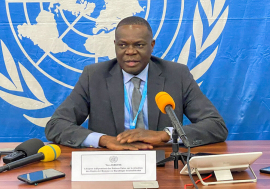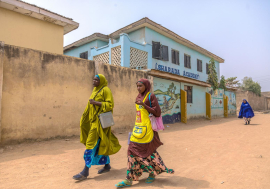Wanted: fresh ideas for combating African poverty
Wanted: fresh ideas for combating African poverty
 School in the Congo Republic: The MDGs have been more successful that other UN development initiatives in mobilizing donor support.
School in the Congo Republic: The MDGs have been more successful that other UN development initiatives in mobilizing donor support.The Millennium Development Goals are likely to remain important for the long-term task of eradicating poverty beyond 2015. But development policy is being challenged by a host of new and old issues brought into focus by the quadruple crises of the past three years: the food, climate, energy and financial crises. The favourable global economic and political conditions that existed when the MDGs were adopted in 2000 do not exist anymore. The crises and their aftermaths therefore require us to "think out of the box," to ask different questions and seek new ways of social and political mobilization to tackle the structural problems that perpetuate global inequalities.
Certainly the MDGs have marked a step forward. They have received unprecedented political commitment and forged a strong consensus on fighting poverty. They have helped expand the international debate over sustainable pro-poor development and over how to mobilize donor support for domestic efforts, especially in health, education and other social services.
When we look back at the range of UN conferences and what came out of them, the MDGs appear to have been more successful than most other attempts at setting international targets for development issues. They also have helped some civil society groups to hold governments in developing countries accountable for their decisions.
On the other hand, as the MDGs garnered international acceptance, we got distracted from the key factor that perpetuates global poverty — the unequal distribution of power at national and global levels. We must not forget that the point of departure for the MDGs was the belief that unregulated global markets and human development go hand in hand. If countries are poor, went the argument, it is because they are not sufficiently globalized. It was a viewpoint that ignored inequality, power relations, poor governance, civil and political rights and other issues.
Moreover, we came to believe that conquering poverty was a technical challenge that could be accomplished with more development aid. Yet the idea that aid can be the basis for development in poor countries is highly debatable. So is the notion that aid can bring any significant degree of global redistribution. Poverty is a result of international power structures, poor leadership, oppression and discrimination. It needs a political solution, not a technical one.
 Kenya’s horticulture industry has been hit hard by the global economic slowdown, setting back the fight against poverty.
Kenya’s horticulture industry has been hit hard by the global economic slowdown, setting back the fight against poverty.Uneven growth
There has been a tendency to attribute the impressive reduction in global poverty to progress in implementing the MDGs. While significant progress has been made on the MDGs in countries where government commitment is backed by strong policies and public expenditure, the global decline in poverty has been caused mostly by rapid economic growth in China, India, Indonesia and Vietnam.
The world is still off track for a number of targets. Most developing countries are projected not to meet the MDGs. There are disparities across regions and countries.
Unlike in the 1980s and 1990s, average incomes in sub-Saharan Africa have grown steadily since 2000, with growth rates averaging over 5 per cent a year. More than a third of Africans live in countries with economies that have grown by more than 4 per cent annually for 10 years, and 18 countries are classified by the World Bank as "diversified and sustained growers."
However, this growth has been based on a boom in commodity prices and consumption that was financed by foreign transfers. Few jobs have been created. Growth has been uneven, averaging more in oil-exporting countries and less in others. Similar disparities are evident within almost all African countries, with data seeming to confirm that inequality increases with growth.
Finally, the few instances of significant poverty reduction in the developing world today have been in countries that have danced to their own music. China, India and Vietnam, for instance, have violated virtually all the rules in the policy guidebook of the International Monetary Fund and World Bank, even while moving in a more market-oriented direction.
Crisis and setbacks
While robust growth helped speed income poverty reduction in many countries, recent high food and energy prices, climate-induced declines in productivity and the global financial crisis have significantly set back the fight against poverty. For the poor, the double shock of higher food and fuel prices threatens survival.
Although sub-Saharan Africa is the region least integrated into the global economy, it has nevertheless been hit hard by the crisis. The main ways in which Africa has been affected are through declines in private financial flows, trade revenue losses, lower remittances, and constraints on aid flows, as donor countries go through their own fiscal adjustments.
These repercussions have in turn diminished prospects for the MDGs. In Kenya, the labour-intensive horticultural industry has suffered a 35 per cent drop in exports of flowers, with inevitable effects on workers. In Zambia nearly a fourth of all mining workers lost their jobs in 2008.
The slowdown in growth has reduced government tax revenues, which will likely bring lower spending on social services — in a region where few functioning social safety nets exist.
The crisis will substantially increase the costs of achieving the MDGs by 2015. Low-income sub-Saharan countries in particular will not be able to finance those costs without additional international aid and/or debt relief. But aid levels are unlikely to rise. Donor commitments were not being fully met even before the crisis.
Beyond the MDGs
From the outset the MDG concept was grafted on the powerful political and economic ideology of unfettered markets as the foundation for human development and poverty reduction. But the global financial crisis has demonstrated that unregulated markets pose a "clear and present danger" to human development.
We know well that economic growth is meaningless unless it is accompanied by measures to reduce structural inequality in society. So the post-MDG agenda should focus on addressing the underlying structures of production, distribution and ownership — and of power — that perpetuate imbalances.
The current crisis provides new openings for activism – opportunities to engage seriously in mass political mobilization to create genuinely redistributive structures and institutions at local, national and global levels.
This means that we need new politics that empower the poor, and values that advance common objectives and ethical principles. We need new institutions that really work on behalf of the marginalized segments of society. There also must be incentives to improve productivity growth, jobs and incomes, as well as resources for realizing human aspirations and human security and for enhancing the capacity and dignity of the individual.
Fantu Cheru is research director of the Nordic Africa Institute, an academic research, documentation and information centre based in Uppsala, Sweden. He was co-editor of Millennium Development Goals: Raising the Resources to Tackle World Poverty (London: Zed Press, 2005), and from 2004 to 2006 was a member of the UN Secretary-General’s advisory panel on mobilizing international resources for the New Partnership for Africa's Development (NEPAD).

















